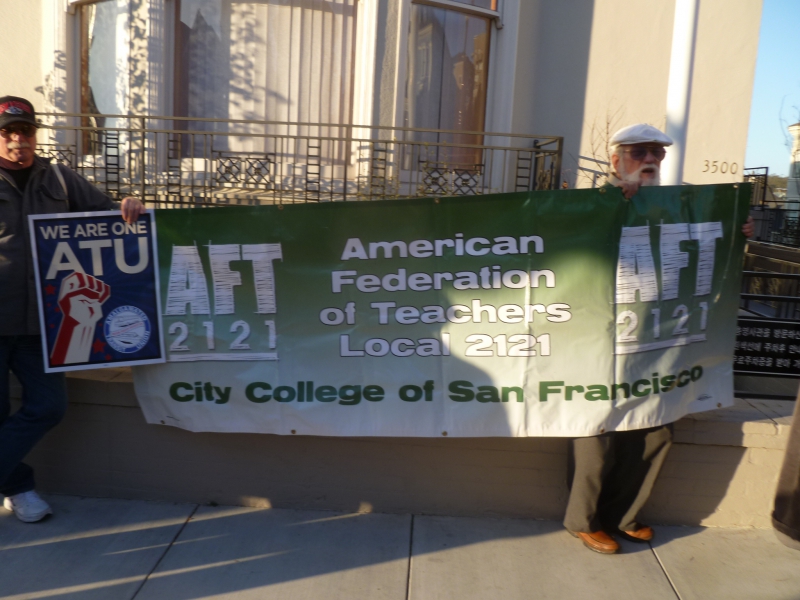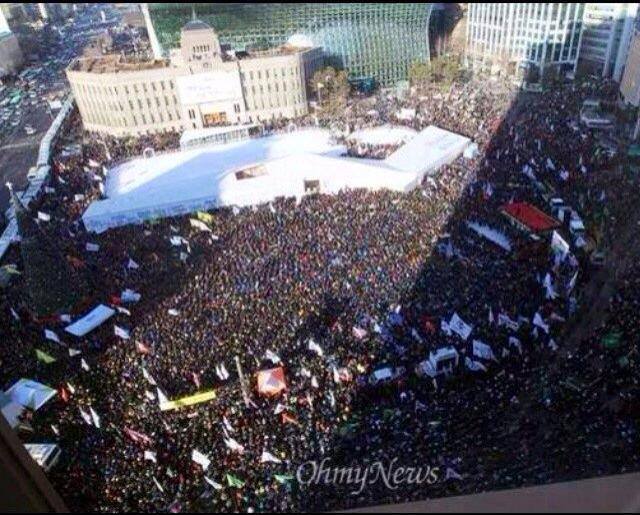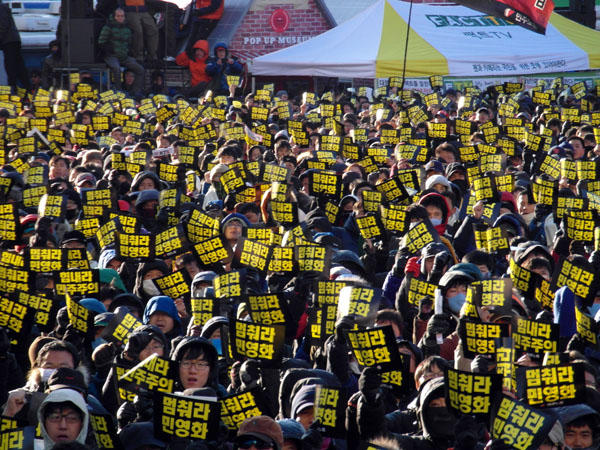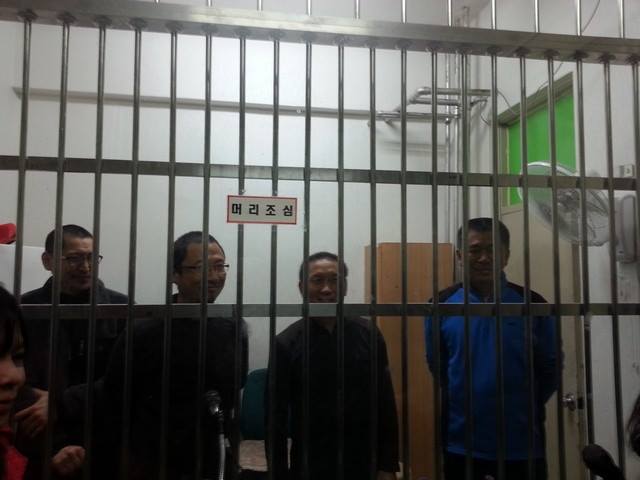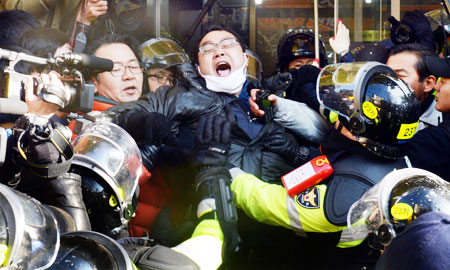From the Open-Publishing Calendar
From the Open-Publishing Newswire
Indybay Feature
SF Teacher Solidarity With Korean Railway Workers And The Action At SF Korean Consulate
San Francisco SF City College faculty member Roger Scott who is also the past president of AFT Local 2121 was accused of being an agent of North Korea when he attended a solidarity rally for the Korean Railway Workers Union who are fighting privatization and union busting.
Teacher Solidarity With Korean Railway Workers And The Action At The San Francisco Korean Consulate
http://www.transportworkers.org/node/1064
AFT 2121 Executive Board Member On Solidarity With Korean Railway Workers Union Action On Feb 17, 2014
by Roger Scott
AFT 2121 Past President City College Of San Francisco
I attended the solidarity rally at the Korean Consulate in San Francisco
on January 17, 2014 to show my individual and my union’s support for the Korean Railway Workers Union (KRWU). The Executive Board of the American Federation of Teachers, Local 2121, which represents the faculty at City College of San Francisco, voted to endorse the struggle by the Korean Confederation of Trade Union (KCTU) against union busting and plans to privatize the KORAIL public rail system. My faculty union wanted to show support for our Korean sister and brother unionists. We oppose not only the attacks on Korean workers but also the attempt to privatize the Korean Railway System and the education system. We are struggling in the United States against efforts to privatize public education, especially higher education, and we’ve seen our share of union busting.
When we arrived at the Consulate, I was pleased that the rally was much better attended than on past occasions; then I realized that many of the people chanting were elderly Korean men and women who, it turned out, were part of a counter-protest organized by the Consular staff. Some of the elderly men were wearing military-style navy-blue berets, medals and campaign ribbons. They were hostile toward us because they had been told that we were supporters of North Korea. Some of them tried to attack a Korean man as they shouted: “Communists, go back to North Korea!”
A young woman approached me, identified herself as a journalist then asked if I was a teacher at City College of San Francisco. I told her that I had taught there since 1972 and that I was a veteran of the U.S. Army and had served as a Peace Corps volunteer in Colombia, also that I had been a teacher in Japan and China. She found it odd that American unionists were supporting the Korean Railway workers: “Most Koreans don’t care much about Korean labor struggles,” she said then asked if the demonstrators from City College were being paid to attend the rally.
“Of course not,” I responded. “That’s an odd question.”
“The older people are being paid to be here,” she said. “Why are you here if you’re not being paid?”
“To show my solidarity for the Korean workers--for unionists throughout the world, an injury to one is an injury to all; that’s a fundamental union principle.” I also mentioned that the Korean union activists I had met at a labor technology conference at the University of San Francisco had impressed me as being intelligent and courageous--and very effective in using technology in their struggle against corporate bullying and government repression.
She asked three times if I had been to North Korea, and some of the older men and women kept calling us “communists and supporters of North Korea.” I mentioned that when I had taught at the Foreign Language University in Chongqing, China in 1986, I had six students from North Korea. “Do you support the government of North Korea?” she asked. “No, but I support reunification of the North and South, and I don’t think North Korea should be isolated from the rest of the world.”
“Do you keep in touch with the North Korean students?” she asked.
“No, but one of them asked me to send him a book after I returned to San Francisco--not about the social and economic history of the U.S. but about “puns.” If she saw any humor or irony in my former student’s request, she didn’t show it.
The shoving and hostility on both sides continued, then suddenly several of the older Korean men--especially the men wearing the navy-blue berets, medals and campaign ribbons--approached me, shook my hand and said: “Thank you, thank you.” One of them seemed pleased when I mentioned that I was a veteran of the U.S. Army.
Rodger Scott, Ph.D.
Instructor, City College of San Francisco
AFT 2121 Executive Board Member, Labor Council Delegate, Past President, AFT Local 2121
xgtel [at] prodigy.net
There will be another solidarity action with the Korean Railway Workers Union and the Korean working people on Feb 28 at 4:00 PM at 3500 Clay St/Laurel St in San Francisco and trade unionists are urged to attend and bring their union banners. (5 photos)
http://www.transportworkers.org/node/1064
AFT 2121 Executive Board Member On Solidarity With Korean Railway Workers Union Action On Feb 17, 2014
by Roger Scott
AFT 2121 Past President City College Of San Francisco
I attended the solidarity rally at the Korean Consulate in San Francisco
on January 17, 2014 to show my individual and my union’s support for the Korean Railway Workers Union (KRWU). The Executive Board of the American Federation of Teachers, Local 2121, which represents the faculty at City College of San Francisco, voted to endorse the struggle by the Korean Confederation of Trade Union (KCTU) against union busting and plans to privatize the KORAIL public rail system. My faculty union wanted to show support for our Korean sister and brother unionists. We oppose not only the attacks on Korean workers but also the attempt to privatize the Korean Railway System and the education system. We are struggling in the United States against efforts to privatize public education, especially higher education, and we’ve seen our share of union busting.
When we arrived at the Consulate, I was pleased that the rally was much better attended than on past occasions; then I realized that many of the people chanting were elderly Korean men and women who, it turned out, were part of a counter-protest organized by the Consular staff. Some of the elderly men were wearing military-style navy-blue berets, medals and campaign ribbons. They were hostile toward us because they had been told that we were supporters of North Korea. Some of them tried to attack a Korean man as they shouted: “Communists, go back to North Korea!”
A young woman approached me, identified herself as a journalist then asked if I was a teacher at City College of San Francisco. I told her that I had taught there since 1972 and that I was a veteran of the U.S. Army and had served as a Peace Corps volunteer in Colombia, also that I had been a teacher in Japan and China. She found it odd that American unionists were supporting the Korean Railway workers: “Most Koreans don’t care much about Korean labor struggles,” she said then asked if the demonstrators from City College were being paid to attend the rally.
“Of course not,” I responded. “That’s an odd question.”
“The older people are being paid to be here,” she said. “Why are you here if you’re not being paid?”
“To show my solidarity for the Korean workers--for unionists throughout the world, an injury to one is an injury to all; that’s a fundamental union principle.” I also mentioned that the Korean union activists I had met at a labor technology conference at the University of San Francisco had impressed me as being intelligent and courageous--and very effective in using technology in their struggle against corporate bullying and government repression.
She asked three times if I had been to North Korea, and some of the older men and women kept calling us “communists and supporters of North Korea.” I mentioned that when I had taught at the Foreign Language University in Chongqing, China in 1986, I had six students from North Korea. “Do you support the government of North Korea?” she asked. “No, but I support reunification of the North and South, and I don’t think North Korea should be isolated from the rest of the world.”
“Do you keep in touch with the North Korean students?” she asked.
“No, but one of them asked me to send him a book after I returned to San Francisco--not about the social and economic history of the U.S. but about “puns.” If she saw any humor or irony in my former student’s request, she didn’t show it.
The shoving and hostility on both sides continued, then suddenly several of the older Korean men--especially the men wearing the navy-blue berets, medals and campaign ribbons--approached me, shook my hand and said: “Thank you, thank you.” One of them seemed pleased when I mentioned that I was a veteran of the U.S. Army.
Rodger Scott, Ph.D.
Instructor, City College of San Francisco
AFT 2121 Executive Board Member, Labor Council Delegate, Past President, AFT Local 2121
xgtel [at] prodigy.net
There will be another solidarity action with the Korean Railway Workers Union and the Korean working people on Feb 28 at 4:00 PM at 3500 Clay St/Laurel St in San Francisco and trade unionists are urged to attend and bring their union banners. (5 photos)
For more information:
http://www.transportworkers.org/node/1064
Add Your Comments
We are 100% volunteer and depend on your participation to sustain our efforts!
Get Involved
If you'd like to help with maintaining or developing the website, contact us.
Publish
Publish your stories and upcoming events on Indybay.
Topics
More
Search Indybay's Archives
Advanced Search
►
▼
IMC Network


